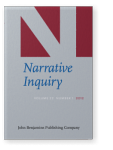Vol. 22:1 (2012) ► pp.24–49
Swearing in literary prose fiction and conversational narrative
This article compares swearing in novels with swearing in everyday talk based on a representative sample of British and American prose fiction and a several large corpora of natural conversation. Swearing allegedly makes fictional dialogue more realistic, but up till now no one has attempted a systematic comparison of fictional and natural conversational swearing. Fiction writers incorporate swearing into their dialogue to delineate characters and to signal emotions, sometimes setting it off from non-swearing talk and commenting on it in various ways. Traditionally, the author’s own voice contained no swearing. By contrast, in conversational narratives, tellers use swearing to obtain the floor, to evaluate action, to mark climaxes and closings, in addition to portraying their characters as swearing. Moreover, in conversation, tellers may hear their listeners swearing along with them, not only to support and evaluate, but also to oppose and even complain about their telling performance.
Cited by (11)
Cited by 11 other publications
This list is based on CrossRef data as of 8 july 2024. Please note that it may not be complete. Sources presented here have been supplied by the respective publishers. Any errors therein should be reported to them.
